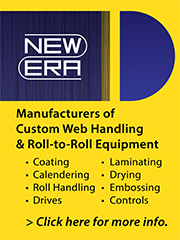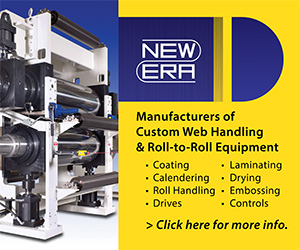The Vacumet Story Is a 30-Year History of Growth
- Published: September 01, 2000, By Deborah Donberg, Managing Editor
With three decades of expansion and acquisition, Vacumet has come a long way from its beginnings, but strong company values remain the same.
Newspapers and magazines tell us almost daily of the latest mergers in the dot coms, banking giants, pharmaceuticals, and some major companies in our industry, as well (the most notable being the recent merger of DuPont and Teijin). The mergers and acquisitions of smaller companies don't make the Wall Street Journal or Forbes, but in the metallizing sector of the converting industry, some of these M&As are just as important as those of the headline grabbers. One of those companies is Vacumet Corp., the Wayne, NJ, metallizer that recently observed its thirtieth anniversary.
Vacumet has never strayed from its core business: depositing evaporated aluminum on a film substrate. Furthermore, it has achieved significant growth by technical innovation and broadening the use of metallized films rather than adding other converting processes.
Substance over Size
Starting in South Hackensack, NJ, with a single 60-in. metallizing machine (now in mothballs), Vacumet today has a total of eight wide-width metallizers supported by 15 slitters and ancillary equipment in manufacturing facilities at Wayne, NJ, Wood Dale, IL, and Atlanta, GA. The machines are kept busy by a total of 130 employees, one half of whom have been with the company for more than ten years.
Vacumet's president, Bob Korowicki, says, "Being big is not necessarily a goal. We want to grow to satisfy the needs of our customers, and we can do that only with the right people in the right places—and with the right customer base."
Bill Foley, manager of customer service/purchasing, points out, "Our philosophy is governed by the company's mission statement: `Vacumet Corp. exists to satisfy profitably the current and future needs of its customers, employees, shareholders, and suppliers, by producing the highest quality, most cost-effective products on a timely basis in a customer-focused atmosphere.'"
Foley never forgets one thing: "To maintain our loyal customer base and increase marketshare, we must keep the quality and performance of our product and service at the highest level possible."
Vacumet was founded in 1969 by the late Tom Hammer. In 1972 he sold it to the John Dusenbery Co. (dusenbery.com). Korowicki explains, "As a machinery manufacturer, Dusenbery thought owning a metallizer would be a good complement to their slitting machines and a showcase for equipment. They hired me as plant manager."
According to Foley, the Hackensack facility covered about 12,000 sq ft. In 1978, the year Foley joined the company, Vacumet moved its single metallizer to a 30,000-sq-ft location in Wayne, NJ. Today, the Wayne plant contains three metallizers, one with a maximum width of 94 in. A new office building was built next to the Wayne plant six years ago. In 1991 the company purchased a metallizing facility in Wood Dale, IL. In the spring of 1999, Vacumet bought a metallizing plant in Atlanta. As a result, the company now has a total of eight metallizers.
"Back in the late 1960s," Korowicki says, "the major markets for Vacumet were wall covering, automotive side molding, Christmas garland, and tinsel. Packaging wasn't even a thought. Our 60-incher was considered a wide machine. It took an 18-inch roll diameter or a 40,000-linear-foot roll of polyester. Pumpdown was 40 to 50 minutes, and 30- to 40-minute roll changes were typical. Metallized film was selling for around a $1.25 a pound over the cost of the substrate."
The Move into Packaging
In the early 1970s, Vacumet worked with a consultant to look into the possibility of marketing metallized polyester films to the packaging market. Korowicki confesses, "We didn't really know how to measure barrier or how much barrier was really needed. If it looked good, that was all that mattered then."
Vacumet's first packaging success with metallized polyester came in 1976. It was the bag for Elkin's Coffee. Static electricity created by the packaging material Elkin had been using trapped coffee dust in the seal area and caused leakers. Oxygen penetrated the bag, and the coffee quickly became rancid. Metallized polyester virtually eliminated static electricity, and the coffee company reported a dramatic increase in the shelf life of its product.
In 1981 Vacumet won the only Pioneer Award ever presented by AIMCAL (Association of Industrial Metallizers, Coaters, and Laminators) for the Elkin's coffee bag. That same year Vacumet received the first Package of the Year award for the CIE perfume carton.
"From that success," Korowicki says, "we took a long look at the packaging market. Our 60-inch machine was not very compatible with the 36- and 42-inch webs used by packaging converters. I sat down with John Dusenbery and his engineering staff, and we designed a high-speed, 76-inch-wide machine with a 1,200-foot-per-minute evaporation speed that could hold a 26-inch-diameter roll. Pumpdown time was reduced to 15 minutes. We were the first to incorporate the technology of a two-drum, dual-evaporation source in the same in-line metallizer."
Changes Keep Coming
Another of Vacumet's innovations grew out of a meeting with the late W.R. Scholle in the early 1980s. "I met him at an AIMCAL meeting," Korowicki recalls, "and Bill said he had a project in the works that needed metallized polyester. He wanted to work with us under strict confidentiality for the next three or four years."
The result was what Korowicki says was the first metallized aseptic liquid packaging material. During that period, Korowicki purchased Vacumet from the John Dusenbery Co. "I was the plant manager, the sales manager, and the mechanic." In 1985 Korowicki sold Vacumet to Scholle Corp., and since then Vacumet has been operated as a wholly owned subsidiary.
As Vacumet's business grew, the company installed its second and third Dusenbery metallizers "to meet the needs of our customers," according to Korowicki. "The wall covering and packaging business grew, and the Christmas garland business shrank. It no longer fit into our strategic thinking. We wanted to devote our assets to the packaging and industrial markets."
Increasing competition fostered the need to expand. In April 1992, after surveying the industry for a possible acquisition, Vacumet bought the UltraVac plant in Wood Dale, IL, a suburb of Chicago. "This plant soon became a dependable part of the Vacumet operation," says Korowicki, "because it had good people and good equipment. It brought us different markets plus a strategic midwest location. Now, Vacumet owned two plants with five metallizers."
Mike Credille is the regional sales manager who works out of the Wood Dale office. "When Vacumet took over this facility," he says, "95 percent of the business was polypropylene toll metallizing. Within a year and a half, we changed that to probably 10 percent. Now, our business is pretty well concentrated on food packaging, balloons, the decal and label industry, and coffee bags. We metallize holograms for point-of-purchase displays, cartons for liquor and golf balls, and cosmetics. Holograms are now showing up on flexible packaging as well."
Adds Korowicki, "Two years later, we were feeling very good about ourselves. We had developed new customers, the market for packaging materials continued to grow, and we were virtually at capacity. We started looking at another acquisition and found a possibility with the 40,000-square-foot Himac plant that Marubeni America Corp. owned in Atlanta. We started conversations in June of '98 and closed the deal April 12, 1999." Vacumet retained a majority of the manufacturing employees and added an additional salesman to cover the Southeast.
Adding Equipment and Awards
When Vacumet acquired the Atlanta location, the backlog of orders could be filled in about two hours. "Within a month," says plant manager Steve Euliano, "we were running 24 hours a day, 4 days a week. A month after that, it was 24 hours a day, 5 days a week. Now, we're running 24 hours a day, 7 days a week."
A new, high-speed, 78-in. metallizer from Darly Custom Technology and a Dusenbery 465 NTR slitter recently were installed, bringing Atlanta's total to three Darly metallizers. "The plant has been remodeled," Euliano reports. "We took office space to give us production area for the new metallizer and slitter."
"When I visit customers," notes Euliano, "I go to the production floor and see how our material runs on their equipment, so I can inform our operators how to serve them better. Once you open a line of communication, you have a better relationship with the customer. This is what has brought Vacumet to the top of its industry."
The Wood Dale and Atlanta plants now are manufacturing satellites with customer service and sales support in each facility. Purchasing and scheduling are centered in Wayne with quality assurance to make certain all Vacumet film is of the same quality regardless of which plant produces it.
"The quality of Vacumet's product is reflected in the awards we've received," says Bill Foley. "We've won 54 AIMCAL packaging awards, including the Pioneer Award, four Package of the Year awards, and the Peter Rigney Award in 1998 for the Best Package of the Year: the Joe-to-Go bag-in-a-box for coffee."
Today, 80% of Vacumet's business is packaging. The remainder is industrial business that consists of label stock, insulation facing, and automotive trim. "We also do a lot of holograms for security and nonfunctional displays," Foley reports. "For example, we metallize the holograms you see on the Colgate toothpaste box and several different liquor cartons. Both the packaging and industrial businesses are growing solidly, and that requires us to expand."
In a very recent development, Vacumet announced that it has acquired Rexam Metallising, the US metallizing operations of Rexam PLC, London, U.K. The Rexam facilities in Indiana and Tennessee are primarily for the metallizing of paper for applications such as labels and decorative packaging. Bob Korowicki will manage this business as well.
The next step in the growth of Vacumet, according to Korowicki, is "to expand our Illinois operation to be completed by April 2002. Vacumet will build a 50,000-sq-ft modern plant and add another wide-width, high-speed metallizer with complementary slitting capacity."
And then? "We will continue to look along the acquisition path."







